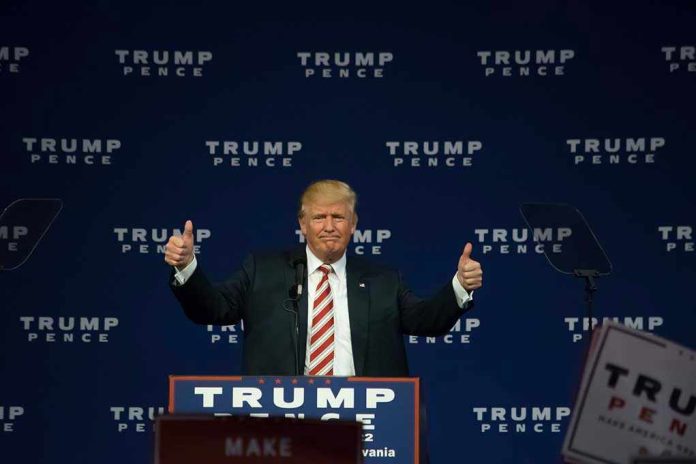
When President Trump forced Canada to scrap its controversial digital tax, it wasn’t just a trade victory—it was a signal flare warning the world that American tech and American interests aren’t for sale, no matter how loudly the globalist crowd howls.
At a Glance
- Canada’s Digital Services Tax targeting U.S. tech giants was scrapped after direct trade pressure from President Trump.
- Trump threatened tariffs and ended trade talks, forcing Canada’s hand just days before the tax was to be collected retroactively.
- Canada’s government will introduce legislation to repeal the tax, with U.S.-Canada trade talks now back on track.
- The move sets a precedent for U.S. leverage in defending its tech sector and signals a warning to other countries considering similar taxes.
Trump Forces Canada to Back Down on Digital Tax Scheme
In a world where leftist bureaucrats think they can squeeze American innovation for a quick cash grab, President Trump’s response to Canada’s Digital Services Tax was about as subtle as a sledgehammer to a glass house. Canada’s 3% tax on U.S.-based tech companies like Google, Meta, and Amazon wasn’t just about “fairness”—it was a blatant attempt to siphon billions from American firms to fund Ottawa’s agenda. The so-called Digital Services Tax was set to rake in nearly $2 billion from U.S. tech, retroactively, starting June 30, 2025. But after Trump abruptly cut off trade talks and hauled out the threat of tariffs, Canada’s Prime Minister Mark Carney found himself backpedaling faster than a cyclist on a hill climb.
This is what standing up for American interests actually looks like—no apologies, no diplomatic doublespeak, just a hard “no” when foreign governments try to play the U.S. for a patsy. Finance Minister François-Philippe Champagne had to publicly eat crow, announcing not only the halt of the DST collection but promising legislation to kill it off for good. Businesses won’t file DST returns, and Canadian bureaucrats will have to find another way to pad their budgets, preferably one that doesn’t involve punishing American innovation. As for the Biden-era handwringing and talk of “multilateral solutions,” Trump’s action cut through the globalist nonsense and forced Canada to the negotiating table on American terms.
A Lesson in Economic Leverage—and Why It Matters
For years, the left and their technocratic friends in Europe and Canada fantasized about making American tech the world’s piggy bank. The EU has already hammered U.S. firms with fines and regulations, and Canada was gearing up to pile on. The Digital Services Tax was their latest scheme—an interim measure, they said, until the OECD could dream up a “global” solution. In reality, it was a shot across the bow for American companies, wrapped in the usual talk about “fairness” and “sovereignty.” But when the U.S. actually flexed its economic muscle, the whole project collapsed in less than 48 hours. Canada may have postured about national sovereignty, but the second Trump threatened tariffs and walked from the table, the illusion vanished. The message? The U.S. will not let foreign governments use American companies as their ATM.
Forget the fantasy that appeasement works. This was a real-world lesson in the power of hard bargaining. The Canadian public is left wondering why their government caved so quickly, while U.S. tech giants are breathing a sigh of relief—no retroactive tax bill, no regulatory chaos. The U.S.-Canada trade talks are back on, and the threat of a full-blown trade war is off the table—for now. But the precedent is clear: If you try to tax American enterprise out of some misguided sense of global “equity,” you’re going to get more than you bargained for.
The Road Ahead: Standing Guard Against Globalist Schemes
Don’t expect this to be the last time the left tries to raid the American treasury under the guise of “digital fairness” or “international cooperation.” The episode with Canada is already sending shockwaves through Europe, where bureaucrats are salivating over new ways to control and tax U.S. innovation. But with this administration, the era of rolling over is finished. Experts and analysts—yes, even those who wring their hands about “fragmenting the global tax system”—now admit that piecemeal national measures only provoke trade fights and undermine stability. The only real solution is a global deal, but don’t hold your breath waiting for the world’s tax-happy governments to agree on anything that doesn’t line their own pockets.
The real takeaway here is simple: Protecting American innovation, American jobs, and American sovereignty requires more than polite conversation and “multilateral” patience. It requires backbone. The rescission of Canada’s DST is a victory for common sense and American strength, and a warning shot to any other country thinking about hijacking our tech sector for their own political gain.
Sources:
Canadian Department of Finance official news release (June 29, 2025)
PwC Canada, “Tax Insights: Canada intends to rescind its Digital Services Tax Act” (July 2, 2025)




